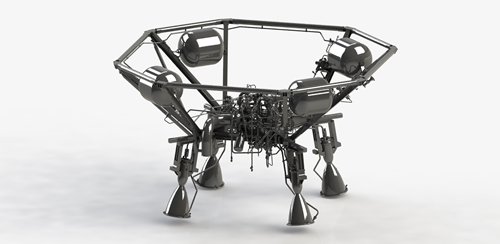HOME >> BUSINESS
Liquid-fuel engine opens higher-end market for rocket firms
Source:Global Times Published: 2019/7/7 20:23:39

A view of Tianque 10-ton liquid-oxygen methane engine of LandSpace Photo: Courtesy of LandSpace
The Tianque 10-ton liquid-oxygen methane engine (TQ-11) independently developed by private Chinese start-up LandSpace has successfully completed a 650-second long-range thrust chamber test, the company announced on Saturday.
The new engine can potentially enable the private rocket company to compete in more profitable space launch market, analysts told the Global Times.
The TQ-11 engine is the second liquid oxygen engine of the Tianque series after the 80-ton engine TQ-12, and it can be used for the Zhuque series rockets to increase the range of the rockets from low-earth orbit (LEO) and sun-synchronous orbit (SSO) to reach medium-earth orbit (MEO) and geostationary transfer orbit (GTO).
Reaching MEO and GTO altitudes means the rockets under the Zhuque series will have a better chance of entering the higher-end segment in the industry, Lan Tianyi, founder of Beijing-based Ultimate Blue Nebula Co, a space industry consultancy, told the Global Times Sunday.
"Generally speaking, satellites operating at the MEO and GTO altitudes are usually of higher value compared with those operating at the LEO and SSO levels," Lan said. "Most of the positioning satellites, for example, operate at the MEO level, including China's BeiDou satellites. Communications satellites, which can cost up to $300 to $400 billion, usually operate at the GTO level."
Lan also noted that China's world-renowned Long March rocket series have already been equipped with the capacity to reach MEO and GTO altitudes, the TQ-11 engines of LandSpace are the first to reach this technical level.
"This is a breakthrough in the design of rocket engines in the private rocket sector in China," said Lan, adding that the engine is to a rocket what a chipset is to a mobile phone - the most difficult component with the highest technical bar.
Previously, LandSpace introduced an 80-ton liquid oxygen rocket TQ-12, and the new TQ-11 engine is designed to be operating alongside TQ-12 to jointly become the second-stage engine for Zhuque rockets.
China's private rocket launch sector has been growing fast. According to a report by 36kr.com, as of January this year, there were more than 60 start-ups in the sector in China, most of which remain at or prior to A-round funding, the report said.
However, Lan observed that for the private sector rocket industry in China, there is still a long way to catch up before entering global competition.
"There is still a big gap between Chinese private companies and the global industry giants such as SpaceX, especially in launch technologies and overall cost control. The new engine will have to wait until 2020 to be installed in the rockets," Lin said. "But the successful test of the engine by Landspace is definitely a small step forward."
Posted in: COMPANIES